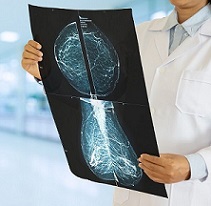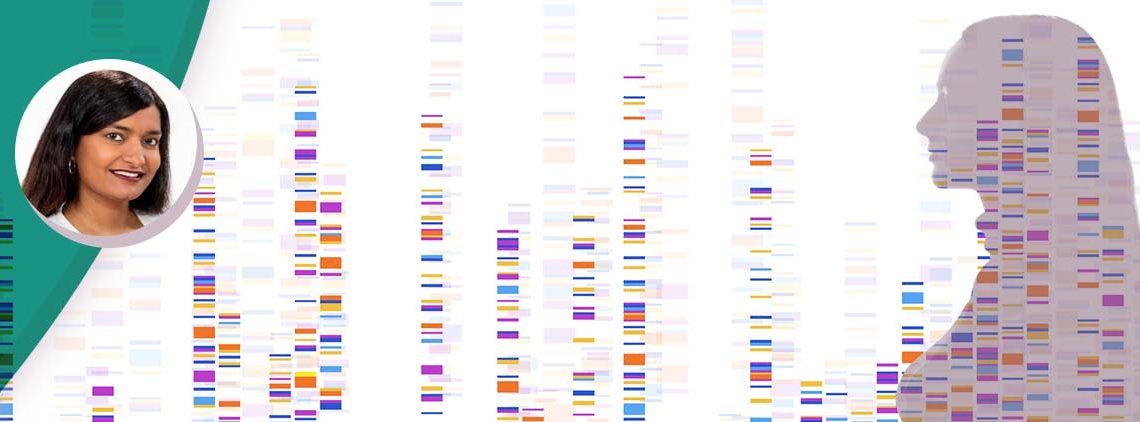By: Kruti McDonald, PA-C, M.S.
Breast specialists at Montclair Breast Center complete a thorough history on all patients to determine if they meet important national guidelines for genetic testing.
Determining if you need genetic testing is very important. With the guidance of your breast doctor, understanding your potential risk of disease can help you make educated decisions on how to best detect early abnormalities or prevent breast cancer. As genetic testing evolves, healthcare experts are evaluating differences in more genes and how they can impact future risk of disease. We’re now aware of more genetic variants that increase the risk for breast cancer, so some patients should consider a more modern and comprehensive test. An MS3 (Ashkenazi panel) or BRCA testing may not be enough.
Variant vs. Mutation
Mutation is a permanent change to the DNA or genetic sequence of a living organism. Changes in DNA do not always cause disease. A genetic variation is seen in groups or population and is observed in genes as well as in alleles.
What are BRCA Genes and How Do They Impact Our Health?
BRCA genetic variants can increase the risk of breast, ovarian, pancreatic and prostate cancer.
All males and females have two copies of BRCA genes. These genes play a critical role in DNA damage repair, which helps prevent cancer from occurring. Populations with a significant BRCA genetic variation have an increased risk of cancer. A BRCA1 variant increases the lifetime risk for breast cancer up to 87% and up to 84% with a BRCA2 variant.
According to the National Breast Cancer Foundation, 1/400 people in the U.S. have a BRCA genetic variant. Ashkenazi men and women have a 1/40 chance of having a BRCA mutation, a significant 10x increase in risk as compared to the general population.
Case Study
 Recently a young female of Ashkenazi descent presented to Montclair Breast Center for a routine 3D mammogram. High-risk screening and breast evaluation were completed.
Recently a young female of Ashkenazi descent presented to Montclair Breast Center for a routine 3D mammogram. High-risk screening and breast evaluation were completed.
Her full family history was reviewed with a dedicated breast specialist, noting that her mother had a triple-negative breast cancer. Additionally, her maternal aunt and grandmother both had breast cancer. Her maternal grandfather had metastatic prostate cancer and paternal female cousin and paternal grandmother had breast cancer. We were immediately curious about her genetic testing status. She explained her mother had negative genetic testing and she was told she did not need testing. Our team inquired about the type of testing her mother had, but she was not certain. She was unable to get her mother’s results.
We determined that perhaps her mother did not have a full panel of testing and despite that, she still met the criteria for genetic testing from the family history on her paternal side. (Men and women can inherit a genetic mutation from either their maternal or paternal side.)
Some women of Ashkenazi descent only have three genetic mutations evaluated and therefore not all the BRCA differences are assessed. Our patient received a full panel of genetic testing and was found to have a significant BRCA1 variant. This was not a founder mutation and would not be found on a limited Ashkenazi panel. It’s fortunate she specifically visited our Center! Instead of simply receiving an annual mammogram, our appointments entail a full breast health evaluation – including risk assessment and prevention strategy.
She was extremely thankful for her diagnosis and subsequently underwent a bilateral prophylactic mastectomy with reconstruction to prevent breast cancer. Elsewhere, she had an oophorectomy to prevent ovarian cancer. She will continue to follow our high-risk program, which will offer supplementary and non-invasive screening such as ultrasound and MRI to discover any abnormalities early.
When evaluating your own family history, please let us know if any of the following apply to your relatives. If so, you are likely a candidate for genetic testing.
- Breast cancer, especially multiple family members or diagnosis at a young age
- Male breast cancer
- Ovarian cancer
- Ashkenazi Jewish ancestry
- Personal history of a triple-negative breast cancer
The experts at Montclair Breast Center will develop an individualized plan of prevention and early detection that fits your unique circumstances, taking into account any genetic concerns.





